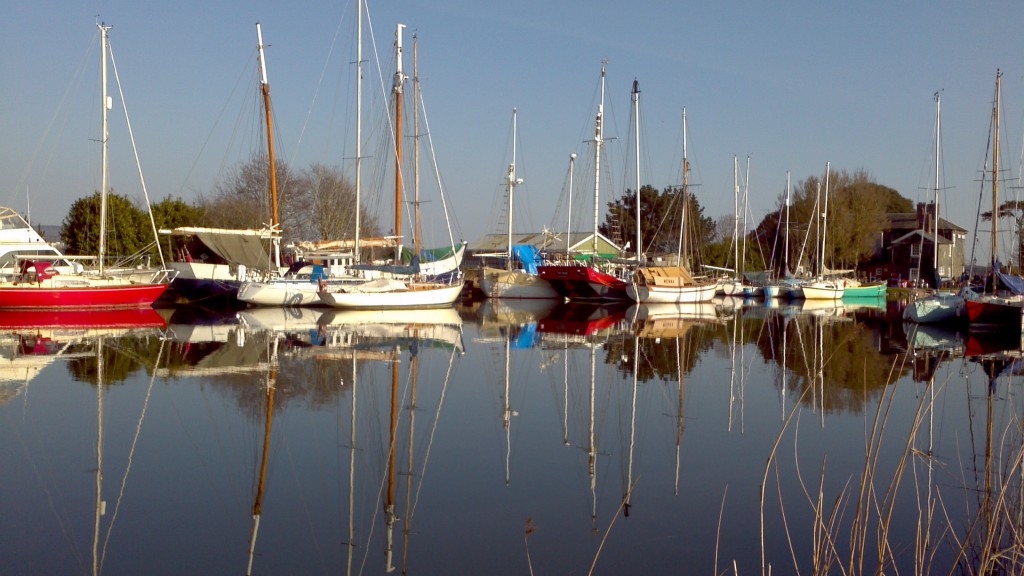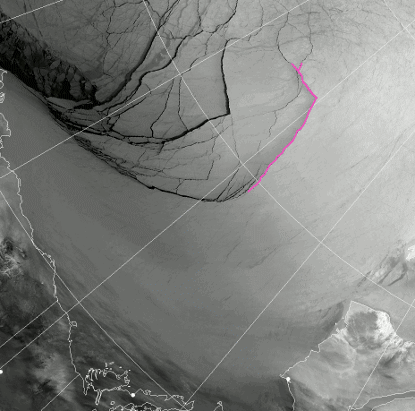April 6, 2013
Spring Has Sprung. What Else Is News?
It was a nice sunny day today in South Devon, for the first time in a very long time. Here's some proof:
Over one month early the Daily Mail announced on March 1st 2013 that:
Spring has sprung: Milder weather, blossoming flowers and the season's first lamb herald an end to wintry conditions.
In common with some of their more recent pronouncements on the great British climate, the Mail got that one wrong. In fact, according to the Met Office rather than The Mail:
Provisional full-month Met Office figures for March confirm it has been an exceptionally cold month, with a UK mean temperature of 2.2 °C.
This is 3.3 °C below the 1981-2010 long-term average for the month, and ranks this March as joint second coldest (with 1947) in our records dating back to 1910. Only March 1962 was colder, with a record-breaking month mean temperature of 1.9 °C.
In an unusual turn of events, this March was also colder than the preceding winter months of December (3.8 °C), January (3.3 °C) and February (2.8 °C). This last happened in 1975.
Not only was March 2013 cold, it was also rather damp at times, down here in Devon at least. According to the table in another Met Office blog post from a few days earlier this is what was happening weather wise in Devon in March:
| Mean temperature | Precipitation | |||
| Region | Actual (deg C) |
Difference from 1981-2010 average (deg C) |
Actual (mm) |
Percentage of 1981-2010 average (%) |
| Devon | 4.0 | -2.7 | 112.9 | 118 |
which made us the wettest county in England over the month. Added to all the previous precipitation in these parts over the previous 12 months, here's some related recent news. The BBC reported two days ago that a Landslip at Oddicombe beach turns sea red:
A landslip at a beach in south Devon has turned the sea in the area red and caused an already partially collapsed empty house to be further damaged. Thousands of tonnes of earth and stone were estimated to have fallen at Oddicombe beach on Tuesday night, Torbay Council said. A section of the beach has been closed as a result.
A bit further down the coast Torbay Council were busy trying to solve another problem. According to the BBC once again Torquay sewer-collapse threat forces raw waste into sea:
Raw sewage is having to be pumped into the sea at a Devon holiday resort in a bid to stop a main sewer collapsing. A breach in the sea wall at Livermead in Torquay caused part of the road to collapse, undermining the sewer. South West Water (SWW) has had to divert flows away from the sewer as a result, forcing it to pump the raw waste into the sea at Hope's Nose.
Campaign group Surfers Against Sewage (SAS) said pumping raw sewage into the sea was "a return to the bad old days". People have been been warned not to swim at Beacon Cove, Torre Abbey and Hollacombe and warning signs have been put up. South West Water said there was also an increased risk of pollution at Shoalstone, Broadsands, Goodrington, Paignton Sands, Preston Sands, Meadfoot, Anstey's, Babbacombe, Oddicombe, Watcombe and Maidencombe.
Heading a bit further afield in Devon now, New Scientist reports this weekend that:
Atmospheric rivers are vast, unbroken streams of water-laden air that can snake thousands of kilometres through the sky. Only recently identified and named, they are huge not just in geographical extent. "In terms of the water they dump as precipitation, atmospheric rivers are every bit as big and bad as hurricanes," says Michael Dettinger of the United States Geological Survey in La Jolla, California.
In the five days leading up to Christmas, the seaside city of Plymouth got more rain than it usually gets in the whole of December. In Braunton, 80 kilometres to the north, the river Caen overwhelmed a recently completed flood-control project, inundating the town with water instead of shoppers. The main rail link connecting the region to the rest of the UK was cut off for six days.
Expanding our focus to include the weird weather across the nation over the last year, the National Farmer's Union is worried that "we're running out of wheat". According to The Independent:
Britain will be forced to become a net importer of wheat for the first time in a decade this year, after the recent bitter weather devastated crops. A disastrous 12-month cycle of poor weather has ruined harvests across the UK, costing farmers an estimated £500m, the chief economist of the National Farmers Union (NFU) warned. The conditions mean Britain – traditionally a significant net exporter of wheat – will have to boost imports by more than a million tonnes.
Nor is wheat the only crop crop affected. Potato plantings stood at just 4,000 hectares at the end of March, barely a 10th of the 30,000 hectare area that had been planted this time last year, implying a jump in potato imports next crop year.
Expanding our focus even further to include the northernmost parts of the Northern Hemisphere, the US National Snow and Ice Data Center reports that:
Spring has sprung in the Arctic. Arctic sea ice has passed its annual maximum extent and is beginning its seasonal decline through the spring and summer. The circulation pattern known as the Arctic Oscillation (AO) reached an extreme negative phase in the second half of the month, associated with unusually high sea level pressure covering nearly the entire Arctic Ocean.
The month was also notable for continued fracturing of the ice cover in the Beaufort and Chukchi seas north of Alaska. This is consistent with wind patterns associated with the strong negative pattern of the AO.
Here's an animation from "A-Team" on the Arctic Sea Ice blog, which reveals that fracturing taking place:
NASA had a slightly different take on the extreme negative phase of the Arctic Oscillation during March. They show this picture of anomalous temperatures across the globe:
and report that:
While a high-pressure weather system brought warmer than normal temperatures to Greenland and northern Canada in March 2013, much of North America, Europe, and Asia shivered through weeks of unseasonably cool temperatures. The contrasting temperatures are no coincidence: the same unusual pressure pattern in the upper atmosphere caused both events.
Has it ever occurred to you that perhaps it would be prudent for the powers that be to start considering what happened to the Arctic sea ice?
Filed under Climate by



Leave a Comment